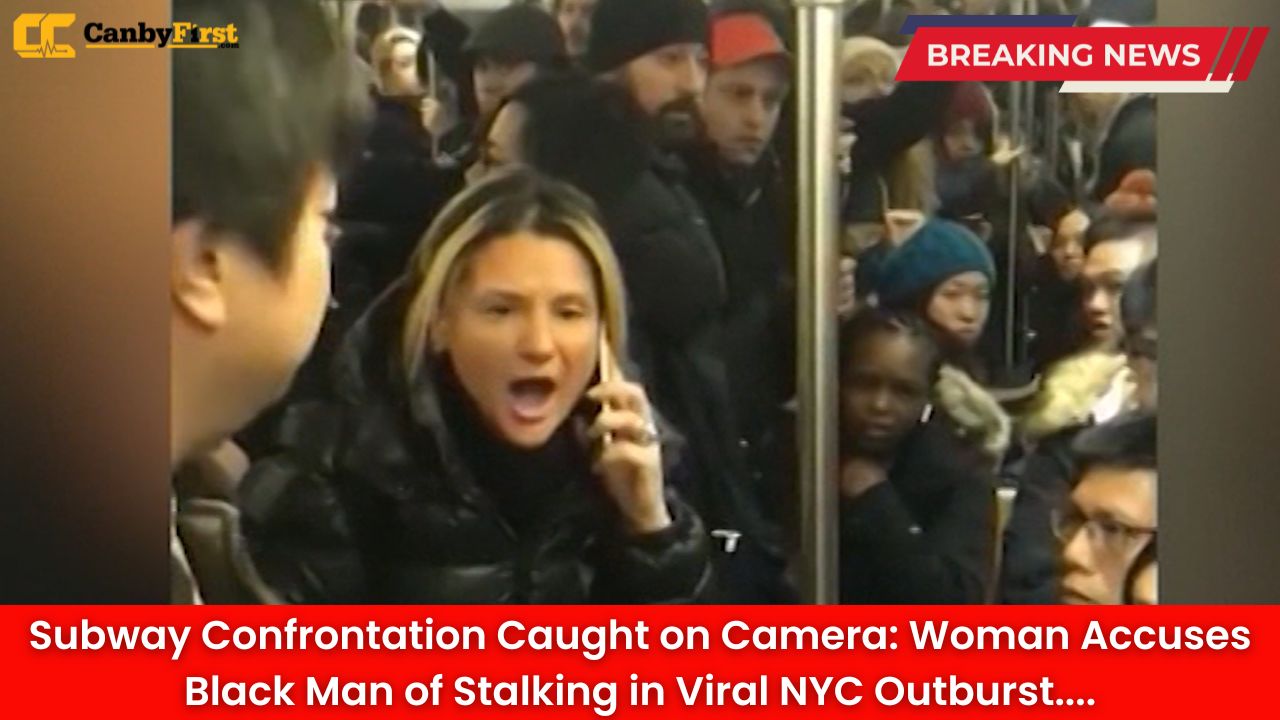A heated confrontation aboard a New York City subway train has gone viral after a woman was filmed shouting at a Black man, accusing him of following and stalking her. The tense encounter, captured by fellow passengers on their phones, has ignited widespread debate about racial profiling, public safety, and civility in shared spaces.
The Incident
According to witnesses, the altercation occurred during an early afternoon commute on the Brooklyn-bound F train. In the video, the woman can be seen standing several feet from a seated man, pointing her finger and yelling, “You’ve been following me!” Her tone grows increasingly aggressive as other passengers attempt to deescalate the situation.
The man, visibly calm and confused, repeatedly denies her allegations and insists that he is simply riding the train home from work. “I don’t even know you,” he says in a measured voice while keeping his distance. Passengers nearby can be heard urging the woman to stop shouting.
Also Read
Moments later, the woman moves to another part of the train while continuing to shout accusations. One commuter can be heard telling her, “He’s not following you, you’re in public. Everyone’s heading the same way.” The video ends as the train pulls into the next station, where the woman exits.
Viral Reaction and Social Media Backlash
The footage, posted to several social media platforms late Wednesday, gained millions of views within hours. Commenters overwhelmingly defended the man, expressing outrage over what many called a “baseless and racially charged” confrontation.
The video’s rapid spread reignited long-standing discussions about how Black men are often perceived as threats in public spaces, even when exhibiting ordinary behavior. Several users compared the scene to previous viral incidents involving false accusations and racially biased assumptions.
Some New Yorkers, however, voiced sympathy for the woman’s apparent fear, arguing that the city’s ongoing concerns about safety and harassment on public transport might have heightened her anxiety — though most agree her reaction was disproportionate and misplaced.
MTA and NYPD Response
The Metropolitan Transportation Authority (MTA) confirmed that it is aware of the video but emphasized that no formal complaint had been filed as of Thursday morning. An MTA spokesperson stated that while passengers have the right to report suspicious activity, false accusations and confrontations can endanger everyone on board.
The New York Police Department is reportedly reviewing security footage from the F train and nearby stations to verify what preceded the exchange. “We encourage New Yorkers to remain vigilant but to also exercise caution and judgment before making public accusations,” a police representative said.
Eye-Witness Accounts
Several passengers who witnessed the confrontation have since spoken out online and to local reporters.
“She just started yelling out of nowhere,” said one woman who filmed part of the encounter. “He was sitting quietly the whole time — no eye contact, no words exchanged before she began shouting.”
Another commuter said the incident made the entire train car uncomfortable. “It’s already tense riding the subway these days with everything going on,” he added. “People need to remember not to jump to conclusions about others.”
Experts Weigh In
Social behavior experts and psychologists note that public incidents like this highlight the intersection of fear, bias, and trauma in urban environments. Dr. Alicia Frey, a sociologist at a New York university, explained that perception plays a powerful role in moments of high tension.
“When people experience anxiety or fear in crowded public settings, they sometimes misattribute their discomfort to someone nearby who looks or acts differently,” Frey said. “The issue arises when those biases align with racial stereotypes and escalate into confrontation.”
Broader Discussion on Racial Bias
Civil rights advocates have condemned the woman’s behavior as an example of racial profiling — an issue that persists in both public and private life. Groups across New York have called for continued education on implicit bias and de-escalation.
“Being accused of wrongdoing for simply existing in a shared public space is an all-too-familiar experience for Black men in America,” said a spokesperson for a local advocacy organization. “This is why accountability and awareness are key to preventing future harm.”
Commuter Concerns and Safety Measures
The controversy comes amid heightened tension across the city’s subway system, which has seen an increase in violent incidents, harassment reports, and commuter anxiety since 2023. Many passengers say the viral altercation reflects how frayed public trust and collective patience have become.
The MTA has been working to improve passenger safety through enhanced surveillance, station officers, and awareness campaigns. Officials say the goal is to strike a balance between vigilance and respect among riders.
Continuing Investigation
As of Thursday afternoon, neither individual involved in the confrontation has been publicly identified. No arrests or charges have been reported. Authorities continue to examine surveillance footage and gather witness statements.
Social media users have expressed hope that both parties can find closure and that the incident will serve as a reminder of the importance of restraint and perspective in shared environments.
FAQ
What prompted the woman to accuse the man?
Witnesses say it remains unclear; there was no prior interaction observed before she began shouting.
Has the NYPD taken action?
No formal action has been taken yet. Police are reviewing footage for context.
What has the MTA said?
The agency acknowledged awareness of the incident and reiterated its stance that false or unfounded accusations can create unnecessary danger.
What does the video show?
It captures the woman loudly accusing a Black man of stalking her on an NYC subway, with the man calmly denying her claims and other passengers intervening.
Why has the video gone viral?
The widespread attention reflects ongoing discussions about racial bias, personal safety, and respect in public settings.












